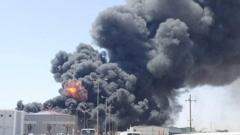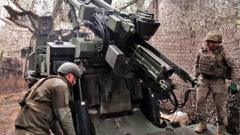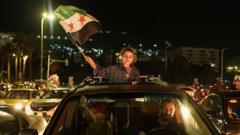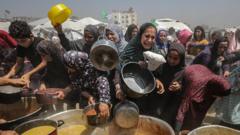As the Rapid Support Forces deploy advanced drone strikes, the humanitarian impact deepens, further complicating the conflict landscape.
**Escalating Drone Warfare Signals Major Shift in Sudan's Civil Conflict**

**Escalating Drone Warfare Signals Major Shift in Sudan's Civil Conflict**
The ongoing civil war in Sudan transforms dramatically with the introduction of drone attacks, revealing new tactical dimensions.
Sudan's civil war has taken a perilous turn as drone strikes by the Rapid Support Forces (RSF) mark a new phase of combat, particularly concentrated in Port Sudan. Previously a refuge in the chaos, Port Sudan now faces unprecedented attacks on critical infrastructure, leading to power shortages and water distress, highlighting the RSF's capability and resolve to maintain warfare despite significant setbacks.
Experts note that the evolving tactics indicate a concerted strategy shift towards remote warfare, showcasing the increased reliance on drone technology. Alan Boswell of the International Crisis Group remarked on the new level of threat, suggesting this illuminates both the RSF's adaptability and the significant technological advancement in the conflict. The RSF's recent barrage of drone strikes—including attacks on the city’s sole international airport and energy facilities—underscores a tactical pivot aimed at demonstrating power and complicating military governance for the Sudanese Armed Forces (SAF).
As the RSF escalates its use of unmanned aerial vehicles, the conflict has effectively escalated into a drone warfare scenario, characterized by a power struggle that is now profoundly influenced by external support. Tensions have further intensified with allegations of foreign arms supplies, implicating the UAE in drone provision to the RSF, which they vehemently deny. In contrast, Iran has been accused of aiding the SAF with weaponry.
The escalation of drone assaults is not just a tactical concern; it also poses severe threats to civilian life. The UN has warned that this new phase could aggravate humanitarian crises across the nation, jeopardizing relief operations. As both factions engage in broader campaigns, the result is a disruptive shift in regional stability, with mounting casualties arising from the conflict.
In this ongoing dilemma, analysts highlight that without substantial diplomatic interventions, the war's evolution may persist for years to come, indicating a lengthy resolution process for Sudan's torn landscape. As the RSF claims to redefine the power dynamics, the implications of drone technology continue to unfold, pushing the boundaries and expectations of modern warfare in Africa.
Experts note that the evolving tactics indicate a concerted strategy shift towards remote warfare, showcasing the increased reliance on drone technology. Alan Boswell of the International Crisis Group remarked on the new level of threat, suggesting this illuminates both the RSF's adaptability and the significant technological advancement in the conflict. The RSF's recent barrage of drone strikes—including attacks on the city’s sole international airport and energy facilities—underscores a tactical pivot aimed at demonstrating power and complicating military governance for the Sudanese Armed Forces (SAF).
As the RSF escalates its use of unmanned aerial vehicles, the conflict has effectively escalated into a drone warfare scenario, characterized by a power struggle that is now profoundly influenced by external support. Tensions have further intensified with allegations of foreign arms supplies, implicating the UAE in drone provision to the RSF, which they vehemently deny. In contrast, Iran has been accused of aiding the SAF with weaponry.
The escalation of drone assaults is not just a tactical concern; it also poses severe threats to civilian life. The UN has warned that this new phase could aggravate humanitarian crises across the nation, jeopardizing relief operations. As both factions engage in broader campaigns, the result is a disruptive shift in regional stability, with mounting casualties arising from the conflict.
In this ongoing dilemma, analysts highlight that without substantial diplomatic interventions, the war's evolution may persist for years to come, indicating a lengthy resolution process for Sudan's torn landscape. As the RSF claims to redefine the power dynamics, the implications of drone technology continue to unfold, pushing the boundaries and expectations of modern warfare in Africa.





















